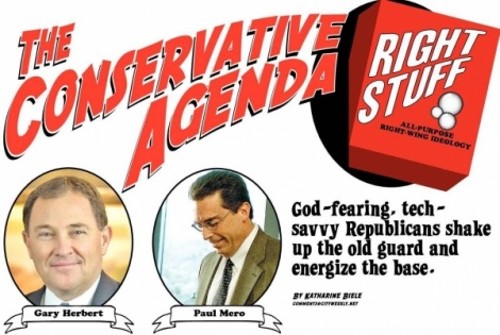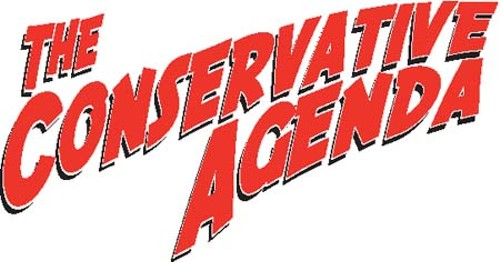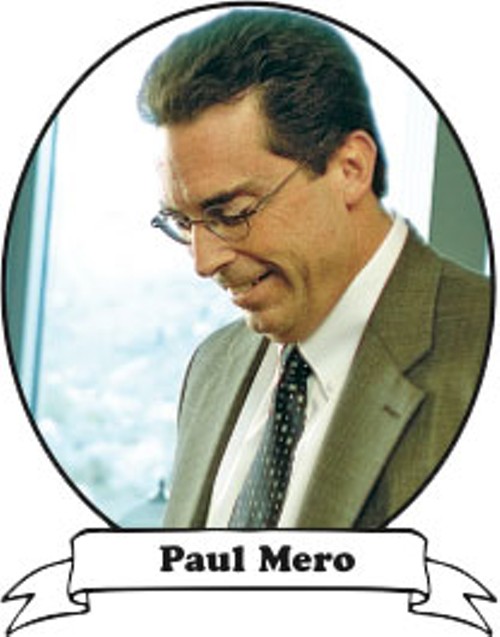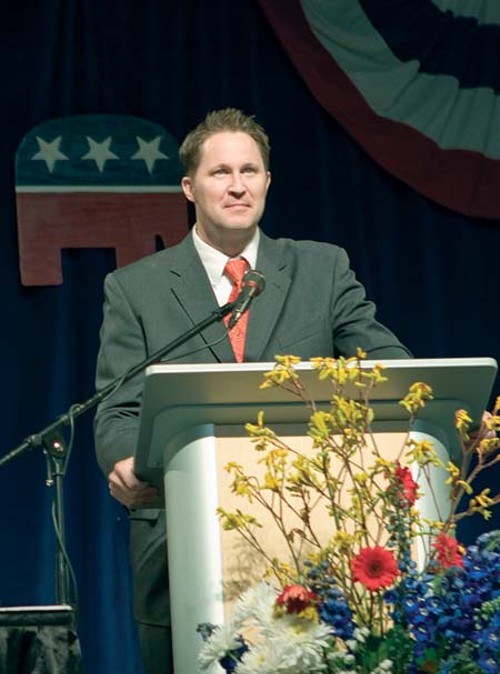The Conservative Agenda
God-fearing, tech-savvy Republicans shake up the old guard and energize the base.
By Katharine Biele @kathybiele
Like so many people now, Paul Mero is trying to figure out just what all this social networking means. You know, what it means personally, politically and, most importantly, culturally.
After all, if you’re about changing the culture of Utah, you’ll want to have all the tools it takes. And the Sutherland Institute, the iconic conservative think tank that Mero directs, does indeed want to change the culture. “Culture drives the law,” says Mero. So, if you want the laws to reflect conservative values, you have to make sure those values are embedded in the culture.
Utah’s far right hopes a new self-avowed conservative governor—Gary Herbert—will bring them back to basic values—the fundamentals of God, country and a fundamentalist morality.
As if Utah Republicans need to worry. A Gallup Poll survey from 2008, released in January this year, ranked Utah as the most Republican state in the nation, with Democrats having a negative 23 point-advantage. Negative. No surprises here. Even in the year of Barack Obama.
“That means Democrats are in the hole from the getgo,” says Pat Jones, of public-opinion firm Dan Jones & Associates and Democratic state Senate Minority Leader.
“You have to get Republican votes to win.”
But even in the negative, Democrats and liberals have made some small strides in the cultural arena—specifically in urban areas. To an ideological conservative, those changes are a bit like a virus waiting to become a pandemic.
So, it’s no wonder that earlier this year, Mero took delight in turning the tables on a little group called Utahns for Marriage Equality, which tried to stifle a Sutherland effort to muddy the message from gay-rights group Equality Utah. If it sounds like a double-negative movement, it was indeed a movement against a movement against an initiative.
Equality Utah had launched what it called the Common Ground Initiative to address issues brought up by the LDS Church last year in the aftermath of California’s Proposition 8. When some church leaders proclaimed they weren’t anti-gay and did not oppose civil unions, Common Ground emerged to talk about health care, fair housing and other legal hurdles for the gay, lesbian, bisexual and transgender (GLBT) community.
Sutherland Institute and the Eagle Forum decided to sponsor a counter-initiative called “Sacred Ground,” to kick off at Thanksgiving Point, in defense of what they believe is traditional marriage.
“Utahns for Marriage Equality wanted to step up to plate and make a response,” says Equality board member Michael Mueller. “We organized a group of people down there at the entrance, with signs and banners and had a rally protesting that event.”
Mueller created a Facebook group called “Protest and Infiltration of Sacred Ground Initiative Launch,” thinking he could stack the deck. “We were trying to take back the news coverage of our event,” Mueller says.
But Sutherland was a step ahead of them. The term “infiltrate” on Facebook got their attention. “Facebook helped us in dealing with the protesters,” says Mero. “All we did was sign up; we got all their names, and then turned them away at the door.
That was kind of an aha! moment for the Facebook crowd, but probably doesn’t signify too much for conservatives. They’ve long been exploring cyberspace, although Mero says they’re still not sure what it all means. The LDS Church, for example, lists 44 social networking sites on its Website, but few would say that the church’s clout rests in its virtual evangelism. REAL PEOPLE, REAL FAMILIES
Politicians, who normally spend huge amounts on advertising, are hoping that social networking means something big, mainly because it’s free. In a study of opposite effects, both Democratic President Barack Obama and Utah’s 3rd District Republican, Rep. Jason Chaffetz, used and benefited from social networking.
“We won because we had the right message and did a better job of communicating it,” says Chaffetz, a freshman congressman who manages to make headlines with his outsider style. Chaffetz says his success comes from standing up for principles and communicating them.
“Should Republicans be
Democrat-light or should they go to so-called right?” he asks. “I think
I did a much better job of using the tools of communication and
engaging masses of people. Traditionally, it was big name plus big
dollars equals big victory. We changed that equation.”
Yes, he
did, and by winning he also transformed the dialogue around the
immigration issue in Utah. Ousting Rep. Chris Cannon, who had been in
favor of a guest-worker program, Chaffetz made waves advocating holding
camps for illegal immigrants.
But neither position represents
real conservative values, insists Mero, who lives in the tension
between conservative intellectualism and conservative politics. He has
experienced tension firsthand after being called on the carpet by
legislative leadership last year. “I was called to the Hill several
times and chastised for our position,” he says.
That was after
Sutherland issued a formal statement—something they don’t do very
often—on illegal immigration, and it wasn’t exactly what the GOP was
expecting. Not by a long shot.
“We draw a distinction
between the illegalities surrounding the broad experience of
well-meaning and otherwise lawabiding people who have violated federal
immigration laws and malicious criminals intent on harming our
citizens,” the statement reads. “Violation of these laws is a public
transgression, not a moral sin.” The statement says Utahns “should
welcome all people of good will to our state, that Utah officials
“should not serve as proxy law enforcement officials for the federal
government,” and even that “we should encourage our neighbors in
violation of federal immigration laws to become thoroughly assimilated,
literate and productive members of our community.”
In other
words, Sutherland emphasized the “real people, real families” side of
the issue, calling for compassion and understanding. The institute also
offered up a study in which they showed side-by-side how “non-citizen
Hispanics” compared to “adult citizens.” Hispanics worked more hours
for less money and more often in the construction industry than did
“citizens.”
“Our legislators fell into the
what-don’tyou-understand-about-the-word-illegal argument … and we tried
to help them understand all the layers,” Mero says.
The traditional far
right in Utah didn’t buy it. “Americans are losing their jobs, the
economy is weak; why are we going out of our way to make jobs for
people who aren’t citizens of the United States?” asks Don Guymon of
Utah Grassroots. Grassroots, a kind of back-to-basics Republican
watchdog group based in Bountiful, has been putting out a legislative
report card since 1992, although its influence has been spotty.
Mero’s
immigration report ran against the political tide and was not an easy
sell, even to the members of Sutherland’s board. Mero spent months
educating the board about the “correct” understanding of human nature
and the “correct” view of human experience. “In politics, it starts to
be a relative thing; not in philosophy,” he says.
For sure, Mero is not a
gray-area kind of guy. While he’s a graduate of Brigham Young
University, Mero wasn’t sure he wanted to actually live in Utah. It was
that cultural relativism thing, apparently. The father of six children,
he and his wife have home-schooled each one, not even allowing them to
participate in church schooling. He gave in to let his boys play
basketball at a local school, but he wasn’t particularly happy about
that, either.
From 1987 to 1997, he worked for Congress serving, of course, conservative representatives. He co-authored The Natural Family: A Manifesto, a book that set him up as a key adversary to the gay marriage movement.
HERBERT: UNCOMPLICATED AND UNTESTED
Despite Mero’s
precision view of conservatism and the natural family, he was stunned
by the immigration disconnect with the largely Republican Legislature.
It was cause for great introspection at Sutherland. How could this
happen among the choir? What could they do to bring everyone back to
center?
“We decided
strategically to turn our attention to the broader public from here on
out,” says Mero. That meant conducting cottage meetings for people they
know as their friends, talking to them, explaining how they go about
things, and generally spreading the Good Word.
Sutherland’s
governing principles are no simple knock-off of the Republican Party
Platform, although there are obvious similarities. Sutherland focuses
on reducing the size and scope of government, protecting and defending
the (natural) family in Utah, and preserving the integrity of public
institutions—something Mero calls “reducing cynicism.”
The
Republican Platform, in contrast, rambles for three pages about the
proper role of government, private property, states’ rights, ethics,
national security, self-defense (aka gun rights), the right to
religious expression, family values, the right to life, and so on.
Sutherland’s public-institution piece has actually brought the
institute into partnership with otherwise liberal elements.
The quest for an ethics commission, for instance, had him holding hands with now-retired Rep. Roz McGee, D-Salt Lake
City. While the two had very different ideas of how the commission
should be formed, they nonetheless agreed that it was vital.
Huntsman is masterful as a politician and knows when to shut his mouth, Mero says. But he suffers the “sin of omission,” which reflects on his integrity. “Politics cherishes winning, not integrity,” Mero says.
Mero
opposes the idea of an independent commission, saying it politicizes
everything. Rather than legislate, he wants to help each legislator
understand his or her personal accountability to the public. “It’s to
reduce the perception of cynicism,” he says. Ethics laws are important
to gain the public trust, not to stop criminal activity, he says.
Utah may be the most
politically conservative state in the nation, but philosophically, Mero
says, it’s more of a “gut” conservatism—something formed by the rural,
LDS heritage in the state and not really by conservative principles.
Mero
sees Herbert as an uncomplicated although untested man, and that lack
of complexity lends itself to conservatism. Principled in his beliefs,
Herbert understands the proper role of government, Mero says.
Mero’s not as
understanding of Gov. Jon Huntsman Jr., lately the conservatives’
target of choice. “Jon Huntsman was elected as a conservative,” notes
Mero. “He supported school choice in convention to get the nomination,
he never said one word about gay rights, he supported Amendment 3, he
never talked about global warming and yet hooked us into the Western
Climate Initiative, and he never said his economic theory rested on the
idea that we ought to make more Hollywood movies in Utah.”
It’s this unwavering
commitment to principle that seems almost inhuman to moderates, but is
the hallmark of Utah’s disenfranchised conservatives.
WELCOME BACK, CONSERVATIVES
“Looking forward to
finishing the garden this weekend before total campaign madness
begins,” his Twitter begins. And ends. That’s the way it is with
Tweets—short and sweet.
In some respects, Philpot is an
unlikely conservative. He talks about himself as a poor boy from the
logging town of Molalla, Ore. He grew up with six brothers and two
sisters. When he was 9, his father left his mother with kids to raise,
and the family got to know welfare firsthand.
“Do I have
liberal tendencies? I understand the need people have for public
welfare,” says Philpot. “Without public education, I wouldn’t have an
education. And yet, I send my kids to private school. I wish everyone
had more choice.”
Philpot, in fact, sponsored the first and
only voucher law to be enacted in Utah—the Carson Smith Special Needs
Scholarship for children with autism.
After attending Ricks
College (now BYU-Idaho) where he met his wife, Philpot came to Utah to
study at the University of Utah. While he was interested in political
science, he wanted more, and threw in environmental studies and
anthropology.
Then in the late 1990s, he went to Washington,
D.C., to do a White House internship during the Clinton administration.
“After I left the White House, I just knew I wanted to be active in
politics,” he says.
How you do that in
Utah is to participate in mass meetings. Utah’s in the minority of
states that use a party caucus or “mass meeting” system instead of a
primary election to choose candidates. Touted as the ultimate in
democracy, these neighborhood caucuses actually draw few people who
then elect delegates to attend party conventions where candidates are
nominated.Since Philpot and his wife were the only ones at his caucus, they each elected the other as delegate.
In 2000, he considered a run against then-2nd District Congressman Merrill Cook, but chose to run for the Legislature instead when then-Speaker of the House Mel Brown resigned. “Everybody just thought for sure that district would go Democratic and I would lose; it was a great and trying experience because no one seemed to want to help me out.” And, of course, there was the money thing. He didn’t have it.
That forced Philpot
into a grass-roots campaign in which he finally did get help from one
well-known conservative, Marty Stephens, who’d taken Brown’s place on
the Hill. When he won the District 45 seat, he took with him the
shoe-leather approach.
“Campaigns and politics are best driven
by the people,” Philpot says. “Campaigns are so money-driven, so
prestige-driven, that people feel totally disenfranchised.” That
outcast feeling is one of the hallmarks of Utah’s socalled
constitutional conservatives.
It’s what started the
Republican Assembly here in the 1990s, and what seemed to resurrect it
last year. It’s what started the Patrick Henry Caucus recently, too, with a focus on “states’ rights.” And it’s
what powered Chaffetz into national office.
It’s the “concept of norms,” says Philpot. “When a large group of people accept a norm, they function better together. The Constitution functions as that norm. I believe it was a divinely inspired document.”
Philpot is among the “newcomer right”
that’s never really been comfortable with
the classification of conservative. “I’m
far more a constitutional American and
a Republican than anything else. At the
same time, I have a great appreciation for
the environment.” And he saw both sides of
it. Philpot watched thriving logging towns
waste away while, according to the logging
industry, the spotted owl thrived. He also
watched an aggressive and environmentally
questionable oil and plastics industry
step in to replace lumber.
FACEBOOK FRIENDS
Philpot left the state from 2004-07 for
law school, and is now in-house counsel
to Reagan Outdoor Advertising, the
politically influential billboard company.
Philpot has his eyes on the vice chairmanship
of the Utah Republican Party. [Philpot
won this race June 13, see sidebar “Get the
Party Started.”] No, not the chairmanship.
He’s not interested in being the face of the
party, but rather the soul.
That’s the claim that Chaffetz makes.
“When Republicans have erred, it’s because
they abandoned their core principles. I
said, ‘Hey, we need to return to these core
principles,’ and I grabbed their interest,”
Chaffetz says. “People feel disenfranchised
by distance, ignored.”
And many are shocked when Chaffetz writes them back on Facebook, for instance. Communication is key, he says. And he means it.
“It took a relative outsider to show the
party what they were doing wrong,” Philpot
says of Chaffetz. “We’ve been against institutional
change, and you don’t really have
an open system.”
But opening the system may be harder
than starting a Facebook page. “Part of my
use of it was out of (financial) necessity,
but you’d better have something to say,”
Chaffetz warns.
Both parties now employ blogs, for
instance, but that’s still a top-down model.
“Blogs are all about how our Republican
leadership can give you a message,” Philpot
says. “We ought to have a far more dynamic
approach; delegates should be able to communicate
with leadership, precinct chairs
communicate with other chairs.” Instant
messaging might be an answer, he says. In
fact, the communication paradigm may be
what’s pumping up the party’s right wing.
Old-school conservative Dave Hansen is running for party chair. [Hansen prevailed, see sidebar.] A former schoolteacher, Hansen never went back to teaching once he got a taste of politics. That was in 1980, when he chaired the state Republican convention and helped get Bill Stevenson elected party chair.
He’s since worked on the Republican
National Committee and has run campaigns
for Utah’s former Republican Gov.
Norm Bangerter, for Lt. Gov. Val Oveson,
for John Swallow when he ran for Congress
in ’92, for Fred Lampropoulos’ gubernatorial
bid in 2004 and for Utah Republican
Sen. Orrin Hatch’s re-election bid in 2006.
Hansen talks about using the new communication
“tools,” but mostly to recruit
volunteers. It’s not surprising that, being
a longtime insider, he doesn’t really think
the Republican Party is in trouble. “We
have great majorities of elected office holders,”
he says in a “no-duh” statement.
But he’s running with and against
people who would change the face of
Republican Utah, or at least massage it.
Conventions are typically showcases for
the party hardliners, those often on the
fringes. And while the chairmanship will
be critical, it is still Gary Herbert’s presence
and his conservative credentials that
will shape the party of the future.
The Sutherland Institute would do away with conventions, certainly to the relief of some. Mero would like to see open primaries for both Republicans and Democrats. It’s more “we-the-people,” he says. And it gets back to his battle against cynicism.
Mero also thinks the open primaries
would bring the parties more to the middle.
For those who see the Sutherland Institute
on the far right, that’s a stunning goal.
Sitting in the Sutherland’s tidy and spotless
office atop the Crane Building, Mero
muses that the goal in politics is to involve
people. Of course, it’s also to ensure that
they have the “proper” perspective, too.
He’s out to change the culture that way.
“There’s great clarity here,” says Mero
says of the institute. Clearly, that’s true.
Speaking of...
-
Monumental Order
Challenging the Antiquities Act of 1906, Trump promises 'tremendously positive things'
- Apr 26, 2017
-
Monday Meal: Pie & Beer Pairings
- Jul 25, 2016
-
Wine (and Gin!) Wednesday: Beehive @ Bandits
- Jun 22, 2016
- More »
More by Katharine Biele
-
Deseret News poll shows Donald Trump skating to another victory in Utah.
Hits & Misses
- Apr 17, 2024
-
LDS General Conference dominates local news while stories on diversity and discrimination take a back seat
Hits & Misses
- Apr 10, 2024
-
Utah's GOP Senate candidates try to out-MAGA each other in a race to the bottom.
Hits & Misses
- Apr 3, 2024
- More »
Latest in Cover Story
Readers also liked…
-
Forget the family pedigree—Robert F. Kennedy Jr should not be the next president of the United States
Trojan Horse
- Jun 21, 2023
-
Women decry harassment and toxic culture at St. George auto dealership
Men at Work
- Oct 11, 2023










